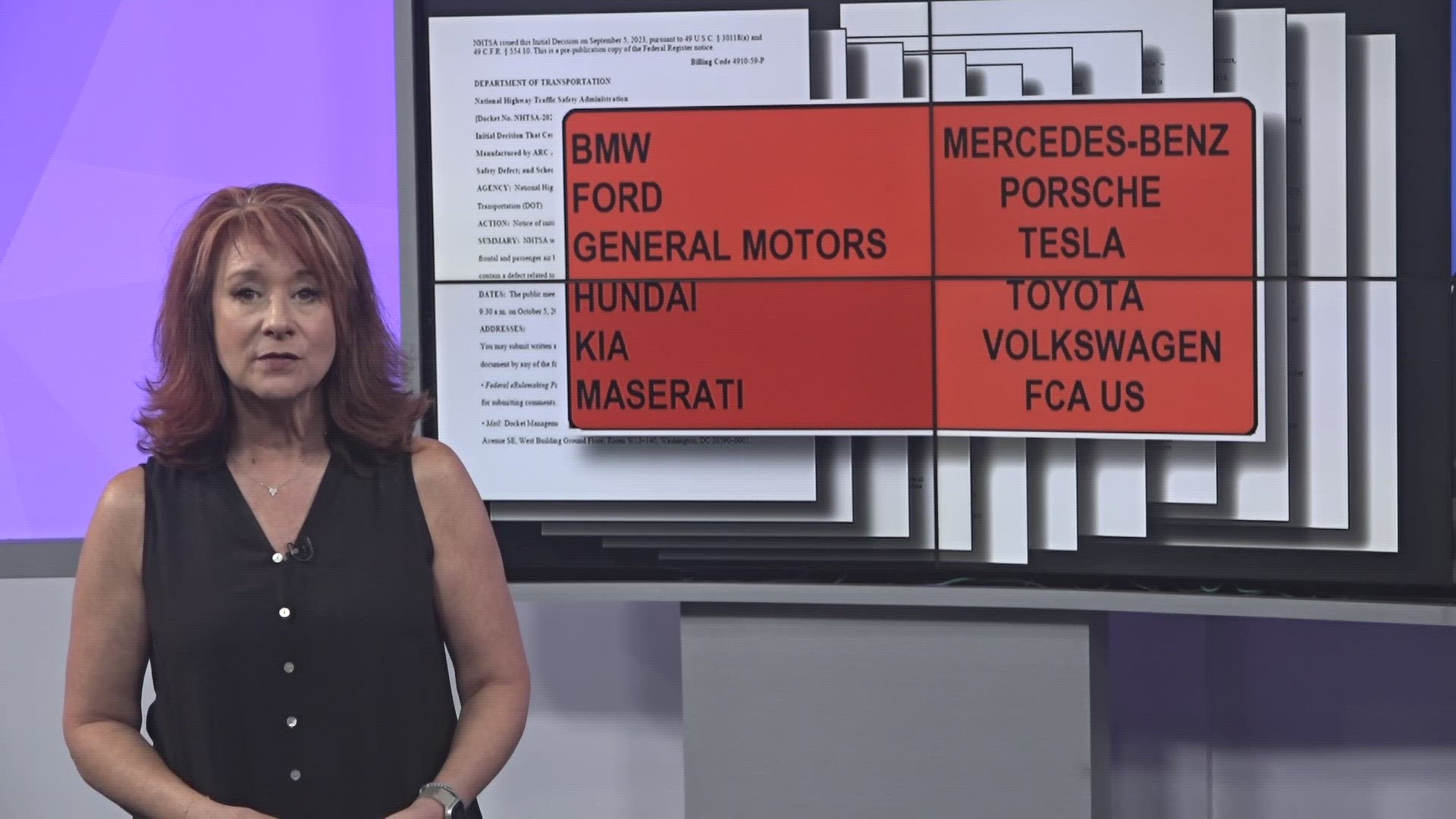GREENSBORO, N.C. — The National Highway Transportation Safety Administration has dubbed 52 million airbags as 'defective' and is recommending that they be recalled.
"The problem with these airbags is that they can explode and they shoot metal into your face. It's Ford, it's TESLA, Toyota, Volkswagen. This is a wide spectrum of vehicles that are affected and it goes back to 2000," said Teresa Murray, Consumer Watchdog, Public Interest Research Group.
NHTSA has identified the airbags made by ARC and Delphi were used by 12 manufacturers and could be in vehicles from 2000 to 2018.
BMW of North America, LLC
FCA US LLC
Ford Motor Company
General Motors LLC
Hyundai Motor America, Inc.
Kia America, Inc.
Maserati North America, Inc.,
Mercedes-Benz USA LLC
Porsche Cars North America, Inc.,
Tesla Inc.
Toyota Motor North America, Inc.,
Volkswagen Group of America, Inc.
The problem is, it's the manufacturers who will determine which specific makes and models and years are impacted IF there is indeed a recall. At this point, neither company, ARC nor Delphi is voluntarily recalling these airbags and manufacturers aren't making any moves either.
WHAT NHTSA BELIEVES IS WRONG WITH THE AIRBAGS
Based on its investigation, NHTSA believes that ruptures may result from the weld slag produced by the friction welding manufacturing process. Should weld slag of a sufficient size become dislodged, it can cause a blockage of the inflator exit orifice when the airbag deploys. A blockage of sufficient size will cause an over-pressurization and rupture of the inflator, leading to the potential forced propulsion of shrapnel or metal fragments from the inflator into the passenger compartment. Additional inflator ruptures are expected to occur in the future, risking more serious injuries and deaths, if they are not recalled and replaced.
At this point, you can't know for sure if your vehicle is impacted or get it fixed.
"Unfortunately with NHTSA and the auto manufacturers, unless it's something that the company has said, hey this is a problem, this is under warranty, then you can get it fixed for free, but not before that," said Murray.
HAVE YOUR VOICE HEARD
The next step in the process is a public meeting where the public can voice concerns and NHTSA can lay out their evidence. The NHTSA meeting is on October 5, 2023, at 9:30 a.m. You can watch the meeting online and you can comment if you wish. You do need to register to watch it.
From the NHTSA docket:
The agency is currently aware of seven confirmed subject inflator ruptures in the United States. These seven ruptures involve both single-stage and dual-stage air bag inflators (as explained below), inflators manufactured at different times and in three different manufacturing facilities, and inflators incorporated into air bag modules by four different module suppliers and used in four different vehicle manufacturers’ vehicles:
• On January 29, 2009, a driver-side airbag inflator ruptured in a Model Year (MY) 2002 Chrysler Town and Country minivan in Ohio. The airbag module was produced by Key Safety Systems, Inc. later d/b/a Joyson Safety Systems, and used a dual-stage ARC inflator. The inflator was manufactured in Knoxville, Tennessee. The driver was severely injured during the incident.
• On April 8, 2014, a driver-side airbag inflator ruptured in a MY 2004 Kia Optima in New Mexico. The airbag module was manufactured by Delphi and had a single-stage ARC inflator. The inflator was manufactured in Knoxville, Tennessee. The driver sustained injuries to the face and legs.
• On September 22, 2017, a driver-side airbag inflator ruptured in a MY 2010 Chevrolet Malibu in Pennsylvania. The airbag module was produced by ZF-TRW and used a dual-stage ARC inflator. The inflator was manufactured in Xian, China. The driver sustained injuries to the face and head.
• On August 15, 2021, a driver-side airbag inflator in a MY 2015 Chevrolet Traverse ruptured in Michigan. The airbag module was produced by Toyoda Gosei and used a dual-stage ARC inflator. The inflator was manufactured in Reynosa, Mexico. The airbag module was a replacement module. The vehicle had been in a prior frontal collision and the original airbag module deployed with no issue. The original airbag module was also produced by Toyoda Gosei and used a dual-stage ARC inflator. The driver was killed.
• On October 20, 2021, a driver-side air bag inflator in an MY 2015 Chevrolet Traverse ruptured in Kentucky. The airbag module was produced by Toyoda Gosei and used a dual-stage ARC inflator. The inflator was manufactured in Reynosa, Mexico. The driver sustained injuries to the face.
• On December 18, 2021, a passenger-side air bag inflator ruptured in a MY 2016 Audi A3 e-Tron in California. The airbag module was produced by Key Safety Systems, Inc. d/b/a Joyson Safety Systems and used a dual-stage ARC inflator. The inflator was manufactured in Reynosa, Mexico. The driver and passenger were injured.
• On March 22, 2023, a driver-side air bag inflator in a MY 2017 Chevrolet Traverse ruptured in Michigan. The airbag module was produced by Toyoda Gosei and used a dual-stage ARC inflator. The inflator was manufactured in Reynosa, Mexico. The driver sustained injuries to the face.
NHTSA is also aware of at least two confirmed field ruptures outside of the United States, again involving the same universe of inflators of varying origins and uses:
• On July 11, 2016, a driver-side air bag inflator ruptured in a MY 2009 Hyundai Elantra in Canada. The airbag module was produced by Mobis and used a single-stage ARC air bag inflator. The inflator was manufactured in Xian, China. The driver was killed.
• On October 16, 2017, a passenger-side air bag inflator ruptured in a MY 2015 Volkswagen Golf in Turkey. The air bag module was produced by Key Safety Systems, Inc. later d/b/a Joyson Safety Systems, and used a single-stage ARC inflator. The inflator was manufactured in Knoxville, Tennessee. The driver sustained no injuries. There was no passenger in the vehicle.

